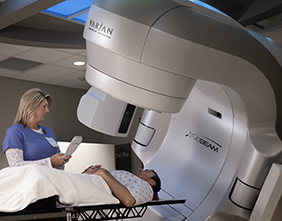Lima Memorial Health Focus: Simple Ways to Decrease Your Risk of Cancer
posted on: 12/27/2017 9:01:33 AM
Health & Fitness Guest Columnist
Jennifer L. Hatton, MD, PhD
Lima Memorial Physicians
Lima Memorial Cancer Institute
Did you know the same things your primary care physician asks you to do every time you see them can actually decrease your risk of getting cancer, decrease your risk of being diagnosed with advanced cancer and decrease your risk of getting blood clots? So many of these simple things your physician asks you to do can have a tremendous impact on your health and longevity.
For example, mammograms and colonoscopies, while not fun and sometimes embarrassing, do decrease the risk of death from cancer. These screening tests have been shown to detect both breast cancer and colon cancer at early stages, usually before you have any symptoms at all. Cancer is much easier to CURE at the early stages before it has a chance to grow and spread. So when your primary care physician asks you to go get your mammogram or colonoscopy, please do so!

Most people understand obesity can increase their risk of heart disease, high blood pressure and diabetes, as well as aggravate arthritis, but did you know obesity increases your risk of cancer? Being overweight has been shown to put women at two-to-four fold higher risk of female cancers such as breast cancer and endometrial (uterine) cancer. Both men and women are up to a twofold higher risk of colorectal cancer, stomach cancer, esophageal cancer, kidney cancer and pancreatic cancer. Other cancers have also been found to be correlated to obesity, such as liver and gallbladder cancer, multiple myeloma, ovarian cancer, thyroid cancer and meningioma (a type of brain tumor).
The average obese patient who has a body mass index (BMI) of 35 or greater has the same risk of developing blood clots (DVTs or pulmonary emboli) as patients with Factor V Leiden heterozygosity. Yet patients and their doctors seem more willing to order (or pay for) hundreds of dollars of blood tests rather than discuss the sensitive issue of weight. BMI is cheap and usually is already known by the time the doctor sees you, if they took your height and your weight. So ask your doctor what you can do to lose the extra weight. Being a healthy weight doesn’t just help your heart, joints, metabolism and your sugars (if you’re diabetic), it can also be another protective mechanism for you to avoid cancer and blood clots.
Lastly, it should go without saying that using tobacco, whether it is from cigarettes, cigars or smokeless tobacco, is bad for your health. When your primary care physician asks you to stop smoking or stop using smokeless tobacco (dip), it’s not because of the known damage it does to your lungs (emphysema/COPD), and heart and blood vessels (coronary artery disease) or the increase of your risk of stroke, blood clots in your legs (DVT) or in your lungs (pulmonary embolism), or the ruining of your teeth and making your skin wrinkle prematurely. Smoking has been found to be directly responsible for causing many types of cancer, including cancer of the lung, larynx (your voice box), mouth (including tongue), esophagus, trachea (your windpipe), bladder, kidney, liver, stomach, pancreas, colon, rectum and cervix as well as acute myeloid leukemia. People who use smokeless tobacco (either as snuff or chewing tobacco) also have increased risks of cancers of the mouth, esophagus, and pancreas.
The National Cancer Institute has stated very clearly that THERE IS NO SAFE LEVEL OF TOBACCO USE. That is why all physicians and healthcare workers, including those of us at Lima Memorial, strongly urge you to quit. Patients who quit smoking, no matter how old they are or how long they have smoked, can have an increase in their life expectancy compared with those who continue to smoke. It has also been shown that quitting smoking at the time of a cancer diagnosis reduces a patient’s risk of death.
This is not the full list of things your primary care physician does to help you stay healthy and decrease your risk of cancer and blood clots. Please talk to your physician to learn what things your physician thinks is best for you to improve your health and stay cancer-free and blood clot-free.
Dr. Jennifer L Hatton received her MD and PhD from The Ohio State University. She trained in Internal Medicine at Metrohealth Hospital, an affiliate of Case Western University Hospital, in Cleveland, Ohio and completed a fellowship in Hematology and Oncology at the University of Kentucky. Her practice is based out of the Lima Memorial Medical Park on 525 N. Eastown Rd, Suite B, in Lima, OH 45807. To schedule an appointment, please call 419-998-4477.
Originally published in The Lima News Health and Fitness section.
Website





